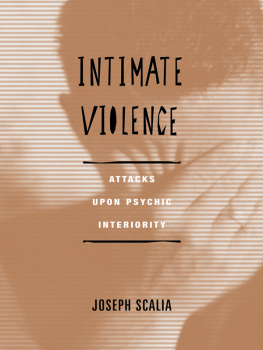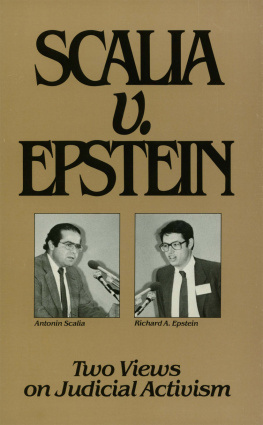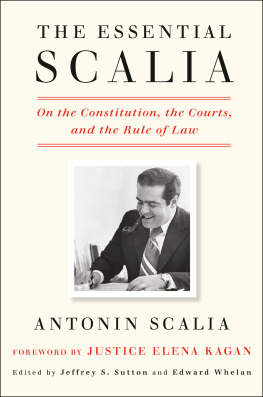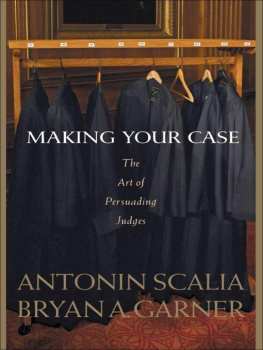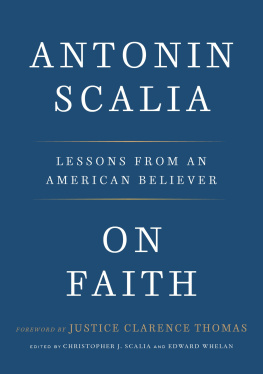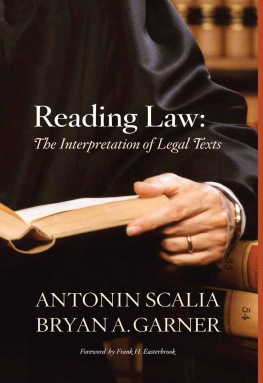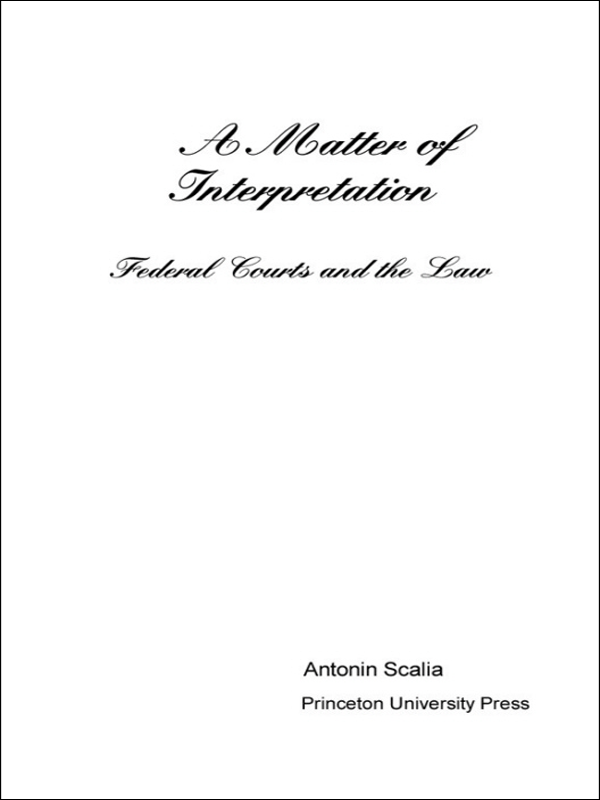 Preface
Preface
T HE RULE OF LAW is essential to constitutional democracy. But its implications for how judges should interpret the law are complex and contested, as evidenced by Justice Antonin Scalias elegant essay and the respectful but challenging responses to it by Professors Ronald Dworkin, Mary Ann Glendon, Laurence Tribe, and Gordon Wood. Together these eminent legal minds address one of the most important legal questions of our time: How should judges interpret statutory and constitutional law so that its rule is a reality that is consistent with a constitutional democratic ideal?
Should the aim of judges be to determine the intent of the legislators who made the law? On its face, this appears to be a democratic aim: to capture the intention of the laws makers, legislators who are accountable to the majority. Justice Scalia offers a powerful critique of this popular idea that judicial interpretation should be guided by legislative intent. A government of laws, not of men, means that the unexpressed intent of legislators must not bind citizens. Laws mean what they actually say, not what legislators intended them to say but did not write into the laws text for anyone (and everyone so moved) to read. This is the essence of the philosophy of law that Justice Scalia develops here in more detail. The philosophy is called textualism, or originalism, since it is the original meaning of the textapplied to present circumstancesthat should govern judicial interpretation of statutes and the Constitution.
The idea that the law is what the words that constitute it mean is of course too simple. Most words are open to multiple interpretations. To say that laws are what their words mean would be to leave the meaning of most laws unacceptably ambiguous. The complexity of figuring out what laws mean should not prevent usas it does not prevent Justice Scaliafrom eliminating indefensible responses to the challenge of interpreting apparently ambiguous laws. Justice Scalia criticizes two alternatives to textualismjudicial decision making according to subjective intent and judicial creation of a living or evolving Constitutionas indefensible ways of interpreting (or failing to interpret) the law. But he also goes well beyond criticism; he develops and defends the merits of his philosophy of textualism.
Justice Scalia shows that textualism is not wooden, unimaginative, or pedestrian; least of all is it boring. Textualism is not strict constructivism, although (he says) strict constructivism would be better than nontextualism. Words do have a limited range of meaning, and no interpretation that goes beyond that range is permissible. Scalias respondents take up his challenge: to show what could possibly be wrong with the commonsensical view that judicial interpretation should be guided by the text and not by intentions or ideals external to it, and by the original meaning of the text, not by its evolving meaning over time.
The questions raised by Justice Scalias commentators are of two kinds: What do judges committed to textualism do when the text is ambiguous? More critically: Why should judges desist from invoking moral principles and other nontextual aids to help interpret the law when the text itself is an inadequate guide?
Justice Scalia anticipates both challenges in his essay, and he also replies to them in his Response. Judges must do their best to figure out, first, the original meaning of laws and, second, the practical implications given new contexts for those original meanings. In most cases, judges will be successful in so doing. Originalism helps specify textualism and helps judges arrive at definite interpretations of the text even when the words are ambiguous. There is plenty of room for disagreement as to what original meaning was, and even more as to how that original meaning applies to the situation before the court, Justice Scalia writes. But the originalist at least knows what he is looking for: the original meaning of the text. Oftenindeed, I dare say usuallythat is easy to discern and simple to apply. Sometimes (though not very often) there will be disagreement regarding the original meaning; and sometimes there will be disagreement as to how that original meaning applies to new and unforeseen phenomena.
But the disagreement of views about interpreting the law represented in this volume ranges much further than resolving ambiguity about original meaning or uncertainty about how to apply original meaning to new and unforeseen phenomena. Professors Wood, Tribe, Glendon, and Dworkin also take issue with other claims that Justice Scalia makes on behalf of textualism. They question whether textualism, as Justice Scalia understands it, is the legal philosophy that is most defensible or most consistent with democratic values. All the commentators concur with Justice Scalias critique of interpreting the law according to either subjective legislative intent or a judges favorite moral philosophy. But they suggest other alternativesincluding some significantly different versions of textualismthat are apparently defensible and democratic, even if not definitive, options. They argue that these alternatives do not suffer from the same devastating flaws as the interpretative strategies that Justice Scalia criticizes.
Professor Wood joins Justice Scalia in worrying about the tension between judicial lawmaking and democracy. Judges, he agrees, should be interpreters, not makers of the law. But Professor Wood, whose area of expertise is American history, also worries that Justice Scalia underestimates the degree to which judicial lawmaking is part of the very constitution of American democracy, albeit an extremely controversial part. Thomas Jefferson struggled, unsuccessfully, to end the eccentric impulses of whimsical, capricious designing man and to make the judge a mere machine. But not all, or even most, of the founding fathers shared Jeffersons aims. Nor did the design of the judiciary follow Jeffersons plan. According to Professor Wood: The courts became independent entities whose relationship with the sovereign people made them appear to have nearly equal authority with the legislatures in the creation of law. The transformation was monumental. If Professor Woods interpretation of American history is correct, then the blurring of legislative and judicial matters may be the rule rather than the exception for postcolonial America.


